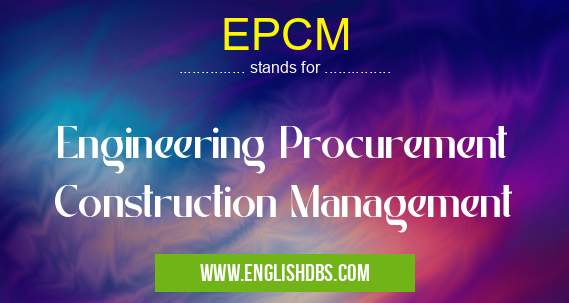What does EPCM mean in MANAGEMENT
In the business context, EPCM plays a crucial role in the execution of large-scale projects, such as industrial plants, infrastructure development, and energy projects. By providing a comprehensive service package, EPCM contractors can streamline project delivery, reduce costs, and ensure the successful completion of projects.

EPCM meaning in Management in Business
EPCM mostly used in an acronym Management in Category Business that means Engineering Procurement Construction Management
Shorthand: EPCM,
Full Form: Engineering Procurement Construction Management
For more information of "Engineering Procurement Construction Management", see the section below.
» Business » Management
EPCM Meaning in BUSINESS
Benefits of EPCM
- Single Point of Contact: EPCM contractors serve as a single point of contact for clients, simplifying communication and coordination.
- Enhanced Efficiency: By integrating all project phases, EPCM can eliminate overlaps and inefficiencies, leading to faster completion times.
- Cost Savings: EPCM contractors often have access to economies of scale, which can lead to significant cost savings for clients.
- Quality Assurance: EPCM contractors are responsible for the overall quality of the project, ensuring that it meets the client's specifications and industry standards.
- Risk Mitigation: EPCM contractors assume a portion of the project risk, providing clients with peace of mind.
Essential Questions and Answers on Engineering Procurement Construction Management in "BUSINESS»MANAGEMENT"
What is EPCM?
EPCM stands for Engineering, Procurement, Construction Management. It's a project delivery method where a single contractor is responsible for managing all aspects of a project, from design and engineering to procurement, construction, and project completion.
What are the benefits of using an EPCM contractor?
EPCM offers several benefits, including:
- Reduced project risk: The contractor takes on the responsibility for the entire project, ensuring accountability and reducing risks for the client.
- Improved coordination: With a single point of contact, communication and coordination between different project teams is streamlined, leading to smoother project execution.
- Cost savings: EPCM contractors often have access to economies of scale and can negotiate favorable terms with subcontractors, resulting in cost savings for the client.
What is the difference between EPCM and EPC?
While both EPCM and EPC (Engineering, Procurement, Construction) involve the contractor's involvement in design, procurement, and construction, EPCM places a greater emphasis on project management. The EPCM contractor is responsible for coordinating and managing all project stakeholders, ensuring that the project is completed on schedule, within budget, and to the required standards.
Is EPCM suitable for all types of projects?
EPCM is commonly used for large and complex projects that require a high level of coordination and risk management. It is particularly beneficial for projects involving multiple disciplines, diverse stakeholders, or geographically dispersed project elements.
How do I select an EPCM contractor?
When selecting an EPCM contractor, consider the following factors:
- Experience and track record: Evaluate the contractor's previous projects and their success in delivering similar projects.
- Expertise and capabilities: Assess the contractor's technical expertise, project management skills, and ability to handle the specific requirements of your project.
- Financial stability: Ensure that the contractor has a strong financial position and can fulfill their contractual obligations.
Final Words: EPCM is a comprehensive project delivery model that offers numerous benefits for clients. By providing a single point of contact, enhancing efficiency, reducing costs, assuring quality, and mitigating risks, EPCM contractors play a vital role in the successful execution of large-scale projects.
EPCM also stands for: |
|
| All stands for EPCM |
